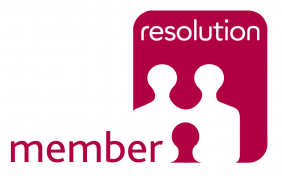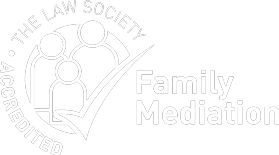Meet the mediator
‘Family mediation is the same as marriage counselling, right?’
This is quite a common misconception. Mediation isn’t about putting marriages back together; it’s about separating, kindly. Mediation is not something couples embark upon to fix a problem in their relationship.
It’s an entirely different process that helps two people work towards or manage an existing separation, to draw a line under the past and move on, as amicably as possible.
We catch up with experienced mediator Susi Gillespie, who’s also Head of our Family Law team, to find out more.

Susi, is it always a straight choice between court and mediation?
No, not always. There are some divorce or separation cases that will never be considered for mediation – where there is extreme urgency, a significant power imbalance, or domestic abuse, for example. Some divorces will always need to be dealt with by the courts.
In most other cases, mediation must be considered before an application can be made to the Family Court (if the parties haven’t already opted for mediation). If the parties’ only intention is to issue proceedings, they will first of all need to attend a Mediation Information and Assessment meeting (a ‘MIAM’) where the accredited mediator will discuss their options and whether or not the parties consider that the court process can be avoided. If it cannot be avoided, the court application can be made.
What’s one thing people need to know before they take the mediation route?
Mediation needs couples to be completely on board with trying to work through their issues together. The process is entirely voluntary. Both people need to be willing to talk through the things that need to be worked out with the help of their mediator. Mediation covers all areas of separation, whether that is unmarried separation or divorce arrangements, the arrangements for the time the children spend with each parent, along with the division of their assets and understanding any future income needs. Couples must be willing to disclose and exchange financial information for financial discussions to take place.
Sometimes, one or both parties is unwilling from the outset to give mediation a chance, or they enter into the process and then find it too difficult to continue. We have to remember that separation and divorce is a hugely challenging and emotionally charged time. While some people are able to work through this (often driven by the benefit of decisions being in their hands, as opposed to decisions about them made by a judge), others aren’t.
Isn’t it really awkward for a couple to come face to face at mediation?
It can be. As a mediator, I definitely feel tension between some couples who have spent months in a less-than-harmonious relationship. But the interesting thing is that once the first or second meetings are under our belts, the tension often dissipates and we all get on with trying to sort out the practicalities that will help them both move on with their lives. I am often very pleased to see unhappy couples smiling and chatting in their final mediation meeting. Mediation offers a way to rebrand a fractured relationship (for further development going forward) into the couple’s post-separation relationship.
Many couples now elect online mediation, which can diffuse initial tensions somewhat.
How formal is mediation?
Relatively informal, in the sense that it’s all about the two people and the mediator, not about rules and process. It’s completely different to court. The mediator is a facilitator – it’s his or her job to guide things in the right direction. The meetings can be conversational, or sometimes we adopt a workshop style approach to drill down on problem-solving, such as sharing capital or understanding parties’ income needs. The meetings have the sole aim of assisting and equipping the couple to reach their own understanding and make joint decisions.
How long does it take?
Mediation usually happens as a series of meetings that each last a couple of hours. Most mediations I’ve been involved in have been resolved in around four to six meetings, but of course there are factors in every case that make things easier or harder to resolve.
Do people worry that their partner will force a resolution they’re not happy with?
I definitely see imbalances in power – and it’s not always in the same direction. I am sure some people worry that they are ‘not strong enough’ to stand up to the other. But mediation is designed to be a really safe environment that is all about collaboration, cooperation and understanding. My job as a mediator is to support two people in getting to a place they’re both happy to be. I quickly pick up on hesitancy and encourage all feelings and wishes to be aired and I have no qualms in calling out inappropriate behaviour and we talk it through. I work hard to ensure both parties have a voice and feel heard and, above all, feel safe.
Can people be caught out and not get everything they’re entitled to?
Although I’m a family lawyer, when I’m a mediator I have to leave my solicitor hat at the office. Mediators can’t give legal advice – that’s not our role. But, like other mediators, I obviously know the law and I can compare potential outcomes with those that a judge might impose. I’ll always flag up that people should get legal advice on particular parts of a proposed settlement. That’s why it’s important that each person’s lawyer is in the background throughout the process, ready to help.
What happens if discussions break down?
There are often points in a mediation when conversations get difficult, and it’s not unheard of for people to walk out. I’m always really keen to help bring things back to the start: why you’re here, how this can work, why the court route may not be a realistic alternative.
But, yes, mediations aren’t always salvageable. Sometimes both sides of the couple just aren’t ready. It’s sad when one person is really keen to work with the other towards a solution but faces a brick wall. Or, one person is positional and will not change their view. These couples usually have to start the (long, often damaging and very expensive) court process.
If mediation does work, what happens at the end?
The concluding document in mediation is called a ‘Memorandum of Understanding’. This sets out the proposals each person has put to the other in mediation and records what the couple has decided and why.
Once both halves of the mediating couple have had legal advice and are content with the settlement they’ve reached, the agreement will be converted into a Financial Remedy Order, often called a ‘Consent Order’. This is done by their respective solicitors (one solicitor drafts and the other approves/amends and this process is also decided in advance in mediation). The signed Consent Order will then be sent to the court to be approved by a judge. Once approved, the order is binding on both parties.
Usually after the order has been approved, the parties can apply for the decree absolute or final order of divorce. This signals the start of new beginnings. Because while mediation is often seen as ‘the end’, it’s really opening a door to the next stage in people’s lives. As I’ve said, mediation can provide an improved relationship between former partners. They’ve been through mediation, aired their views, seen the other’s perspective, and usually made concessions in the interests of fairness. As a result, some couples move on, post-mediation, communicating on better terms – something that can be particularly important when there are years of co-parenting ahead.
To find out more about family law mediation, contact Susi Gillespie or call our Family Law team on 020 3811 2894.











